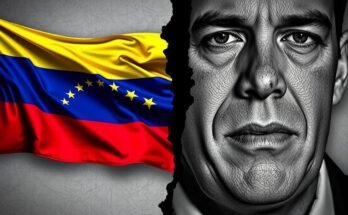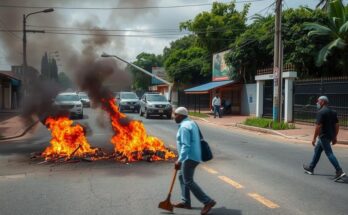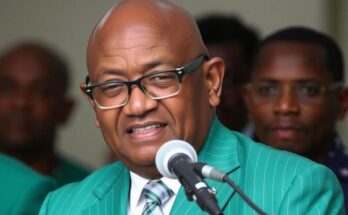Mozambicans will vote on Wednesday, with the ruling Frelimo party expected to win despite growing support for independent candidate Venâncio Mondlane among younger voters. Frelimo has faced criticism for electoral manipulation, and analysts project a continuation of its power amid youth dissatisfaction with the status quo in a nation grappling with economic challenges.
On Wednesday, Mozambicans will cast their votes in elections where the ruling Frelimo party is anticipated to secure a comfortable victory, despite an emerging outsider candidate resonating with younger voters in a nation marked by a median age of 17. Frelimo has held power since the cessation of Portuguese colonial rule in 1975 and is presenting a presidential candidate for the first time who was born post-independence, Daniel Chapo, a relatively unknown provincial governor selected in May to succeed outgoing President Filipe Nyusi. Frelimo traditionally faces opposition from the Renamo party, which engaged in a civil conflict with Frelimo from 1977 to 1992, resulting in an estimated one million fatalities. Recently, Venâncio Mondlane departed from Renamo to campaign as an independent presidential candidate. His charisma has garnered him significant traction among young voters. Analysts maintain a skeptical outlook regarding Frelimo’s potential loss of power, citing strategic impediments imposed on campaigning and voter registration for opposition figures. Borges Nhamirre, a researcher at the Institute for Security Studies, remarked, “The election is never difficult for an authoritarian regime. No matter what happens, the final result doesn’t depend on the voters’ will.” Mondlane’s fervent addresses at nightly rallies have mobilized support across the country and compelled other candidates to engage more on social media and commit to renegotiating contracts pertaining to natural gas and mining sectors. Nhamirre noted, “Mondlane is a gamechanger … If this was a fair and free election, at least Mondlane would be the second [placed] candidate.” However, there are concerns that Frelimo may manipulate electoral outcomes to position Renamo’s leader, Ossufo Momade, in second place to diminish Mondlane’s impact and discourage other independent political movements. Economically, Mozambique ranks as the eighth poorest country globally, with a GDP per capita of a mere $608, despite being endowed with substantial natural resources such as coal and rubies. The exploitation of its vast natural gas deposits has been hindered by an insurgency in the Cabo Delgado province, linked to the Islamic State. The economy faced further turmoil following the unearthing of $2 billion in concealed debts in 2016, which resulted in international funding withdrawals. As the urban youth of Mozambique grow increasingly discontented with the current governance landscape, analysts believe that the previous electoral framework is likely to repeat itself. Anne Pitcher, a professor at the University of Michigan, stated, “They’ve already done the rigging before the election. They’ve made it difficult for people to register to vote. In the areas where they are strong, they then make sure that they do a more comprehensive registration.” Concerns of electoral integrity have been raised, with the Public Integrity Center reporting in June that nearly 879,000 false voters were registered among 17 million. In Gaza, a prominent Frelimo stronghold, it asserted that a third of the registered voters were “ghost voters.” While Mondlane’s candidacy ignites enthusiasm among many young people, it has also fragmented the opposition. Dércio Alfazema, an independent political analyst, expressed, “People are not very satisfied with the country’s situation and many voters will vote against Frelimo. But I don’t think these votes will be enough to remove Frelimo from power.”
The upcoming elections in Mozambique are set against a backdrop of historical political dominance by the Frelimo party, which has been in power since 1975, following independence from Portugal. The current political landscape is characterized by tensions between Frelimo and its traditional rival, Renamo, which has a storied past involving civil war and significant loss of life. The median age in Mozambique is low, suggesting a youthful electorate that may be seeking change amid widespread dissatisfaction with the status quo. Recent economic challenges, including the fallout from the tuna bond scandal and a burgeoning insurgency in the north, have compounded the complexities of the political climate. The portrayal of an outsider candidate, Venâncio Mondlane, signals a potential shift in political dynamics, attracting the interest of a disenchanted youth eager for reform.
In conclusion, while the ruling Frelimo party appears poised to maintain its stronghold in Mozambique’s elections, the emergence of candidate Venâncio Mondlane highlights a significant youthful desire for change. Despite extensive challenges such as electoral manipulation and a history of conflict, there lies an undercurrent of potential disruption that may pave the way for future political shifts. The elections reflect not only the immediate political scenario but also the broader, enduring implications for governance in a country struggling against poverty and past adversities.
Original Source: www.theguardian.com




